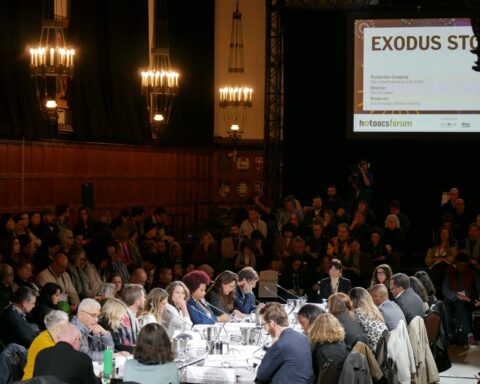It’s fair to say that without cultural advocates, much of what is considered sanctioned, official support for the arts in Canada would not exist. Without nationalists like Graham Spry or Alan Plaunt in the 1930s pushing for a national public radio system, the creation of the CRBC (the first radio incarnation of the CBC) would have stalled. The same holds true historically in the creation of the documentary and feature film industries and the kinds of ongoing policy supports argued for and defended by our director, writer and actor guilds.
Yet, it’s work that is never done; it never ‘arrives’ at a complete satisfactory stasis. Sure, there are victories but to be frank, it’s work I’ve often felt is downright Sisyphean: you roll that great rock up the political hill, and one way or another, against countervailing forces, it starts to tumble down. It requires, as Albert Camus one said, constant ‘revolt’. It means without years of hard, passionate, dogged work we wouldn’t have the arts and culture industries that we do, however greatly flawed. It’s unlikely many know the names of the cultural warriors who toil on our collective behalf, so let me shine the spotlight of this page on one of them: Lisa Fitzgibbons, the outgoing executive director of the Documentary Organization of Canada, the founding organisation of this publication.
A long-time cultural advocate, Fitzgibbons’ seven years with DOC, which lobbies on behalf of Canadian independent doc makers, occurred at a significantly troubling time. Not only has the media industry been disrupted by the ascension of Internet distribution, but it has also suffered through the consolidation undertaken by our typical partners (broadcasters) with the approval of a regulator increasingly indifferent to true diversity of voice. The result has been a drifting away from support for independent documentary, falling licence fees, and the dumbing down in prime time of the form itself (e.g., “Doc Zone”, with its waste of significant filmmaker talent compelled to create journalistic surveys for easy consumption). Fitzgibbons’ time also occurred during the reign of the Harper government, one of the most hostile this nation has ever seen towards the arts.
Nevertheless, under her stewardship, DOC worked hard to produce solid research, and it published two critical documents that were vital to its advocacy work: Getting Real: An Economic Profile of the Canadian Documentary Production Industry and, most recently, Growing the Pie: Alternative Financing and Canadian Documentary. Fitzgibbons also led strategic talks over refinements to the Canadian Media Fund’s POV program, dove into the arcana of copyright reform, and created the National Fair Dealing Road Show.
Over these seven years I never failed to be inspired and educated by her brilliance and collaborative skill, her tireless outreach across the country, and her command of the policy instruments at play either on behalf of independent producers or for our market foes. Nor did I fail to be calmed by her quenching gin martinis.
Most recently, Fitzgibbons spearheaded documentary interests during the CRTC’s mammoth “Let’s Talk TV” hearings, which required, among other things, heading up a committee and overseeing research that had to parse the dispiriting agendas of scores of interventions and briefs. It’s the kind of work even those close at hand don’t fully appreciate. I know this first hand, as I was there along side her at the CRTC hearings, and it was a privilege. Let me quote from the public record what she wrote (Oral Presentation before the CRTC, September 19, 2014):
We have come to this proceeding with all the openness and optimism we can muster when looking to the future for Canadian documentary programming. But truth be told, we’re not optimistic. In spite of all the hearings where documentary issues have been brought forward over the years, in spite of evidence that has been presented on the genre’s decline, the dire situation persists…. To those who accuse us of being self-interested, we’d like to counter and say that we’re not self-interested but passionate about the stories we have to tell and we’re passionate about finding a way for them to connect with Canadians…. Canadians have certainly demonstrated they want Canadian docs— but we wonder whether the regulated system now and in the future will provide us a fair chance. That is the question we leave you with today.
By the time you read this, the regulator will likely have dropped their report on “Let’s Talk TV”, hopefully answering Fitzgibbons’ and many other questions presented before them. I know I’ll be seeking her out for that martini before I sit down to read it. Somehow I think we’ll both need it.











